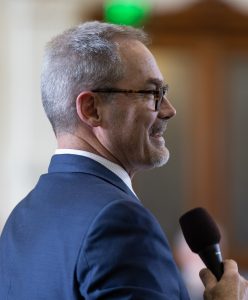Last year, the Permian Basin Petroleum Association created a set of recommended practices to combat oilfield crime, incorporating physical, cyber, and operational security measures. The Association took the initiative to the next level, citing the prevention of industry theft as a PBPA legislative priority and advocating at the Texas Capitol for related legislation.
Stephen Robertson
“The legislature stepped up to that call in resounding fashion,” said PBPA Executive Vice President Stephen Robertson. Operators, law enforcement, and the judicial system now have new tools to strengthen the fight against the organized crime that threatens public safety and is costing the economy hundreds of millions of dollars. (For more on that angle, visit bit.ly/smuggling-crude).
“We knew going into session that legislative action would be needed to help address the growing threat of oilfield theft,” Robertson shared. “We are incredibly grateful for the work of the legislature in addressing this issue so thoroughly.”

Kevin Sparks
PBPA offered particular thanks to Sen. Kevin Sparks and Sen. Phil King, and Chairman Drew Darby, Chairman Tom Craddick, Chairman Brooks Landgraf, and Vice Chair Eddie Morales in the House for their leadership and stewardship.
“Protecting our energy resources is essential to the Permian Basin and the state as a whole,” declared Sparks, who announced industry crime as one of his legislative priorities and filed three packaged bills. “Oilfield theft has been a persistent problem throughout Texas, impacting the state for years, and it’s time we take a collaborative approach to fighting organized criminal activity.”
The following, summarized by Robertson, made it through both chambers and to the governor’s desk:
House Bill 48 creates an Organized Oilfield Theft Prevention Unit within the Department of Public Safety to combat theft involving oil and gas equipment in Texas. This unit is tasked with investigating specified oilfield theft-related offenses. The unit is required to coordinate with federal, state, and local agencies, and to engage with communities affected by such thefts. The headquarters will be positioned in the Permian Basin but will be responsible for investigations statewide. In addition to investigations, the unit’s responsibilities include providing specialized training to local law enforcement, conducting outreach programs to educate the public and industry professionals, and maintaining a database to track thefts and related criminal activities. H.B. 48 was signed by the governor and is effective immediately.
Senate Bill 494 aims to combat the theft of petroleum products in Texas by creating a dedicated task force within the Railroad Commission of Texas. The task force will consist of members from the oil and gas industry, energy trade associations, and various law enforcement agencies to ensure a comprehensive approach to the issue. The task force’s duties involve:
- conducting an ongoing study of petroleum theft, which will include reviewing laws from other jurisdictions;
- analyzing the impact of petroleum theft on sales tax revenue and assessing the broader economic implications;
- making specific recommendations for outreach and prevention programs aimed at stakeholders; and
- making recommendations for law enforcement training on effective strategies to combat this crime.
S.B. 494 was signed by the governor and will go into effect Sept. 1, 2025.
Senate Bill 1806 addresses regulations concerning the inspection, sale, and management of petroleum products, oil and gas equipment, and oil and gas waste. It amends existing criminal procedures and establishes new definitions and procedures particularly focused on petroleum products, such as crude oil and condensate. This bill enhances inspection capabilities by training officers to conduct thorough inspections of cargo tanks suspected of transporting petroleum products. These inspections allow for sampling and forensic analysis. The bill revises penalties for theft of petroleum products and oil and gas equipment by introducing a graded system based on the value of the items appropriated, ranging from third- to first-degree felonies, significantly increasing the stakes for theft in this sector. Moreover, it establishes criminal penalties for operating disposal wells for oil and gas waste without necessary permits from the Railroad Commission, also graded by the value of waste disposed of. S.B. 1806 was signed by the governor and will go into effect on Sept. 1, 2025.
Senate Bill 1646 addresses criminal conduct involving the theft and unauthorized possession of copper and brass and regulates the sale of such materials to metal recycling entities. It significantly broadens the definition of “critical infrastructure facility,” now encompassing various utility and telecommunications structures, which adds new layers of protection against theft. Under the newly added provisions, committing an offense by damaging or stealing copper or brass from these facilities is now classified as a felony of the third degree. The bill delineates a new offense called unauthorized possession of certain copper or brass material, which is initially deemed a state jail felony but escalates to third-degree felony under specific aggravating circumstances, such as previous convictions or possession from critical infrastructure. Moreover, metal recycling entities face new obligations, requiring thorough recordkeeping of transactions involving copper or brass. This includes maintaining comprehensive records, documenting the nature and source of materials, and ensuring compliance with strict acquisition protocols. Entities violating these regulations face administrative penalties of up to $10,000. S.B. 1646 was signed by the governor on May 30 and is effective immediately.
This legislation will indeed aid in the fight against oilfield crime, but these laws, alone, won’t be enough, Robertson cautioned.
“Operators must do their part to monitor and make reports of illicit activities on their locations,” he emphasized. “As a guide on how to do this, we direct everyone to PBPA’s Recommended Oilfield Security Measures, available at https://bit.ly/pbpa-oilfield-security.”
“Furthermore, local, state, and federal law enforcement along with regulatory agencies overseeing operations in the field must do their part to participate in investigations of illicit activities and develop cases through which district attorneys can secure convictions,” Robertson continued. “This is a threat that requires us all to do more, and PBPA is here to help respond to that call in every way we can.”

Ben Shepperd
PBPA kept a watchful eye on other legislation, including a proposal to address inactive wells. Senate Bill 1150, relating to the plugging of and reporting on inactive wells subject to the jurisdiction of the Railroad Commission of Texas, was sent to the governor’s desk on May 28.
“Currently, operators can seek, and the Railroad Commission has routinely granted, multiple plugging extensions,” explained PBPA President Ben Shepherd. “The inactive well population in Texas has ballooned to over 150,000.”
Under this legislation, operators cannot obtain extensions for plugging inactive wells if they have been inactive for over 15 years and 25 years have passed since completion, unless specific conditions are met, Shepherd continued. Operators can request compliance plans that detail their commitment to plugging or restoring inactive wells by Sept. 1, 2042.
Factors such as economic conditions and compliance history will be considered. In addition, The Commission must submit an annual report on inactive wells to state authorities, including statistics on inactive wells, plugging activities, and financial assurance methods.
“PBPA was supportive of this legislation, and some of our members argued for even more stringent limitations on plugging extensions on inactive wells,” Shepherd stated.
Additional industry-related legislation will be discussed by PBPA following the veto period.
No Small Feat

Joan Huffman
From a numbers standpoint, seeing legislation through from filing to passage is an impressive accomplishment. According to the Legislative Reference Library, senators and representatives filed 8,719 bills and 2,765 resolutions this session, which began on Jan. 14. By the session’s end, 140 days later on June 2, 1,189 bills had been sent to the desk of Gov. Greg Abbott.
The governor has 20 days following the session’s end to veto bills, after which they become law regardless of his signing them. As of press time, Abbott had vetoed two bills.
Limelight Legislation
Early headlines focused on a renewed attempt to pass private school vouchers, which failed during the last session. When all was said and done, history was made when both chambers approved legislation to create a $1 billion private school voucher program, Abbott’s top legislative priority. The bill will allow qualified families to use $1 billion in taxpayer funds to pay for their children’s private school tuition and home-school expenses.
“This is an extraordinary victory for the thousands of parents who have advocated for more choices when it comes to the education of their children,” Abbott said.
On a related note, lawmakers approved a school finance package that will send some $8.5 billion to public schools to fund employee salaries, operational expenses, educator preparation, special education, campus safety, and early childhood learning.
Main Mission
State law requires the legislature to adopt a state budget for the next two years. Lawmakers entered this session with a near-record surplus of $24 billion. The final version of the budget as spelled out in Senate Bill 1 totals $338 billion, an 8.3 percent increase over the last budget and a 43 percent increase over the budget from four years ago.
“This budget reflects conservative principles of fiscal responsibility and prioritizing the needs of Texans,” said Sen. Joan Huffman, chair of the Senate Finance Committee. “Through months of diligent work and principled negotiations, we have crafted a balanced budget that adheres to our constitutional and statutory spending limits while addressing the challenges of our growing state.”
Budget highlights, according to Huffman, include the following:
- the largest increase in funding for the Foundation School Program in Texas history to support pay raises for teachers and support staff, provide better support for special education students, and to enhance school safety;
- funding to support new property tax relief through additional maintenance and operation rate compression, to raise the residential homestead exemption to $140,000 with an additional $60,000 exemption for those over 65 and disabled, and provide a $125,000 exemption from the business personal property tax;
- allocations addressing public safety such as hiring additional DPS Troopers, bolstering law enforcement funds for rural communities, improving initiatives to retain and recruit Department of Criminal Justice correctional and parole officer positions, and equipping cities and counties to combat organized crime;
- funding for the Texas Energy Fund to ensure long-term reliability and resilience of the state’s electrical grid;
- support for specific projects across the state to address water infrastructure, flood, wastewater, and supply needs; and
- additional money to support the state’s transportation needs for highway project development, construction, and maintenance.
A supplemental appropriations bill is adopted each legislative session to adjust the current budget to cover cost overruns, account for savings, and provide additional funding for new and existing programs.
House Bill 500 served as this session’s supplemental bill and included $100 million to plug abandoned oil wells
For additional information, go to www.pbpa.info.
Julie Anderson, who formerly was editor of this magazine, is currently editor of a sister publication, County Progress Magazine, which can be found at CountyProgress.com.
The post Count It a Successful Session appeared first on Permian Basin Oil and Gas Magazine.
pboilandgasmagazine.com (Article Sourced Website)
#Count #Successful #Session
